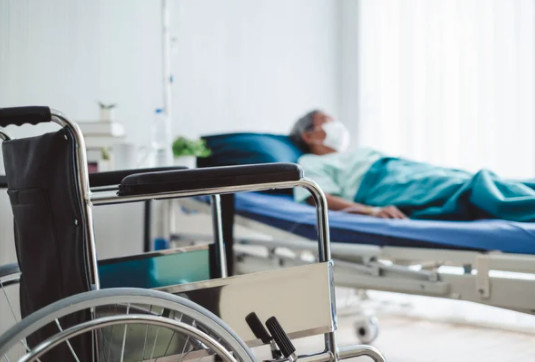Whether you care for an older family member, or not, it’s prudent to prepare in advance for a trip to your local emergency room. When the unexpected happens, and you find yourself headed to the hospital, chances are you’ll be in a rush and not thinking straight.
It’s highly likely that you’ll be stressed and panicked – and if you are the caregiver, more concerned about the situation at hand than what will be required later. Your mind will race a million miles a minute trying to think of all the different things they and you will need.
Add to that, medical emergencies are scary – for everyone. Worst-case scenarios flood through your head. If you are the caregiver or loved one, it’s imperative you remain, calm, relaxed, and in control. Even if it’s for perception’s sake only! Your loved one is scared, looking to you for reassurance, to quell their fears.
So, prepare for tomorrow, today. Pack your bags and those of your loved ones. Label them with your name and address and tuck them away in a closet, safe but close at hand.
And, discuss hospitalization with your loved one, in advance, before it happens. So that when the time comes, they know what will happen and are emotionally prepared. Empowered by your foresight and preparation.
Keep the list somewhere that is always easily accessible, next to your phone, bed, front door or on your fridge.
Keep your essential information on hand
Regardless of the circumstances, it’s a good idea to have a comprehensive list on hand, with all your essential information written down, on a single page, that you can just refer to or give to the nurse when you arrive. When we are not feeling well, or under duress, we forget what we normally take for granted, so err on the side of caution, be prepared and write down all your essential information, so you don’t have to remember it later.
Preparation also ensures no time is wasted, and that you or your loved one receives the medical care needed, as quickly as possible.
Personal information sheet
Create a document that includes the following information for the person going to the hospital:
- Name and preferred language
- Contact information for personal doctors, key family members, ministers, and helpful friends (also program this information into a cell phone, if applicable)
- Illness or medical conditions
- All current medicines and dosage instructions (updated)
- Any medicines that have ever caused a bad reaction
- Any allergies to medicines or foods; special diets
- Need for glasses, dentures, or hearing aid
- Degree of impairment and amount of assistance needed for activities
- Behaviors of concern; how the patient communicates needs and expresses emotions
What the hospital will need
Include copies of important documents, information the hospital will need such as:
- Identification
- Payment method
- Medical Aid information
- Durable Power of Attorney, Health Care Power of Attorney, Living Will and/or an original DNR (do not resuscitate) order, if applicable.
- Medical history.
Medical information such as allergies, previous medical visits, aversions to particular medicines, current or previous medications, and genetic medical history are a few things that will help make an ER visit more efficient. It is imperative that doctors are informed of any medical history crucial to providing emergency care for a patient. - Situation details.
It is important that doctors receive as many details as possible regarding the reason for the patient’s emergency visit. What is the issue? Where did the incident occur? What were the circumstances surrounding the incident? When did the injury occur, or how long ago did symptoms of the illness start becoming noticeable? All of this information greatly helps doctors develop a diagnosis quickly and accurately.
Pack your ready-to-go bag
When preparing a ready-to-go bag for your loved one always include the following:
Patient clothing and supplies
- A change of clothing, and change of underwear
- Toiletries including a toothbrush and toothpaste
- Current medications
- Cell phone charger
- Moist hand wipes such as Wet Ones. Plastic bags for soiled clothing and/or adult briefs
- Reassuring or comforting objects
- An iPod, MP3 or CD player; earphones or speakers
- A cozy blanket
- A warm sweater and a change of comfortable clothing including sweatpants
- Slippers and night gown
- Tissues
- Skin lotion and lip balm
- Bottled water and healthy snacks* (check with a nurse before you give your loved one anything to eat or drink
The bag should have important documents and a personal information sheet that includes a list of medicines, allergies, degree of impairment, and behavior of concern.
Items That you Can’t Prepare in Advance
There are some items that may not be practical to pack in advance. It’s worth keeping a list of these as well so that when that moment comes, you don’t have to panic trying to remember what items were not included on your initial list. Last-minute items include a walking frame, phone, hearing aids, etc.
If you use hearing aids, then pack some spare batteries in your hospital bag. If you wear glasses, include a spare pair of reading glasses. If you use a walking frame or wheelchair, put a name tag on it.
Depending on the circumstances, you may also need to pack incontinent products including adult pull-ups and wet wipes, diabetic supplies, or anything else they may need to manage their conditions over a 24-hour period.
If your family member has dementia, you’ll also want to have comfort items on hand that will help ease any confusion or anxiety they experience while in the hospital. So, whatever they normally use at home, will be useful to have on hand under these circumstances. Whether it’s an iPod, favourite reading, a stuffed animal, a photo – it doesn’t matter. If it has emotional significance bring it. And add it to your last minute list.
And don’t forget to pack a bag for you. If your loved one or patient is overnighting, chances are you will be too.
Caregiver ready-to-go bag
- A change of clothing
- A charger for your phone or tablet
- A notebook to write down questions or instructions. Keep a log on your care partner’s symptoms and problems. You may be asked the same questions by many people. Show them what you have written instead of repeating your answers.
- Cash for emergencies
- Family doctor contact information
- A copy of your loved one’s advance directive
- A book, knitting, or other activities you like to do
- Toiletries including a toothbrush and toothpaste
- Sleeping mask, or earplugs to enable some sleep in unusual circumstances
Download Hospital Bag Checklist here:
DISCLAIMER: This website does not provide medical advice. This information, including text, graphics, images, and other material contained on this website is for information purposes only. No material on this site is intended to be a substitute for professional medical advice, diagnosis, or treatment. Always seek the advice of your physician or other qualified health care provider with any questions you may have regarding a medical condition or treatment before undertaking a new health regime, and never disregard professional medical advice or delay in seeking it because of something you have read on this website.
Sources:
https://dailycaring.com/caregiver-essentials-hospital-trips/
https://www.tn-elderlaw.com/free-resources/blog/october-2020/preparing-for-unexpected-trips-to-the-emergency-ro
https://www.pacificprime.com/blog/what-to-pack-if-you-have-an-unexpected-trip-to-the-hospital.html
https://www.theemergencycenter.com/preparing-for-an-er-visit/
https://www.agedcareprepare.com.au/the-ready-2-go-bag-hospital-bag-checklist-for-emergencies
https://www.nextavenue.org/caregivers-checklist-hospital-trips/

